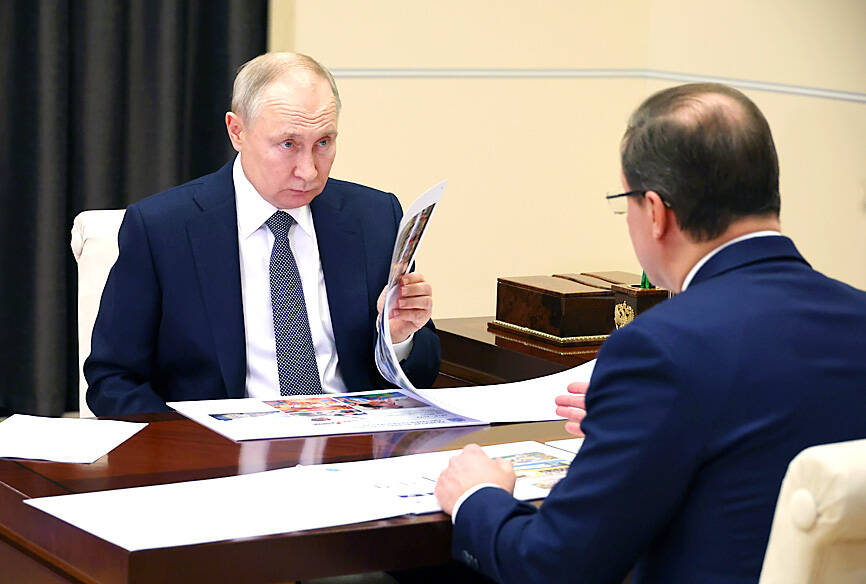The US on Tuesday threw its support behind a special international tribunal to try Russia for “aggression” against Ukraine, building momentum to prosecute the crime for the first time since the aftermath of World War II.
The EU has backed a special tribunal, which could bring fresh charges against Russian President Vladimir Putin and would be the latest legal salvo after the International Criminal Court issued an arrest warrant for him over alleged war crimes.
The US Department of State said that the US would work with allies to set up a “special tribunal on the crime of aggression” over Russia’s invasion of its neighbor in February last year.

Photo: EPA-EFE / MIKHAEL KLIMENTYEV / SPUTNIK / KREMLIN POOL
“We envision such a court having significant international support — particularly from our partners in Europe — and ideally located in another country in Europe,” state department spokesman Vedant Patel told reporters.
US Ambassador-at-Large for Global Criminal Justice Beth van Schaack said that Washington wanted the court to have international personnel and resources.
That “will provide the clearest path to establishing a new tribunal and maximizing our chances of achieving meaningful accountability,” Van Schaack said in a speech at the Catholic University of America in Washington on Monday.
The US was “committed” working with other countries to provide resources for such a tribunal “in a way that will achieve comprehensive accountability for the international crimes being committed in Ukraine,” she said.
It was the first time that the US has explicitly supported a special tribunal on Ukraine.
The EU in November last year floated the idea of a tribunal, which was backed formally in January by a vote of the European Parliament.
Czech Minister of Foreign Affairs Jan Lipavsky, speaking to a democracy summit via videoconference on Tuesday, said that his country “strongly advocates” the special tribunal, adding that Putin’s invasion brought memories of forced land concessions to Germany by what was then Czechoslovakia in 1938.
The crime of aggression, then known as a crime against peace, was last prosecuted in the aftermath of World War II, and formed a basis of the Nuremburg and Tokyo trials of officials from Nazi Germany and imperial Japan.
The International Criminal Court since 2018 has had jurisdiction over the crime of aggression, but legal experts say it cannot prosecute Russia as the country, like the US, has not joined the Rome statute that set up the tribunal in The Hague.
Nations not part of the court can still be referred by a vote of the UN Security Council — where Russia would be certain to exercise its veto power.
The idea of a special tribunal was first promoted shortly after the Ukraine invasion by former British prime minister Gordon Brown, alongside legal academics.
Brown, in a petition in March last year, said it might be “easier to establish responsibility” for the crime of aggression than for individual war crimes as there was “so clearly a gross violation of the United Nations Charter.”
The International Criminal Court’s arrest warrant stems from accusations that Russia unlawfully deported Ukrainian children.
US Secretary of State Antony Blinken has balked on whether the US in theory would arrest Putin.
Under a law of the US Congress, Washington is restricted from cooperating closely with the court.

Chinese President Xi Jinping (習近平) is to visit Russia next month for a summit of the BRICS bloc of developing economies, Chinese Minister of Foreign Affairs Wang Yi (王毅) said on Thursday, a move that comes as Moscow and Beijing seek to counter the West’s global influence. Xi’s visit to Russia would be his second since the Kremlin sent troops into Ukraine in February 2022. China claims to take a neutral position in the conflict, but it has backed the Kremlin’s contentions that Russia’s action was provoked by the West, and it continues to supply key components needed by Moscow for

Japan scrambled fighter jets after Russian aircraft flew around the archipelago for the first time in five years, Tokyo said yesterday. From Thursday morning to afternoon, the Russian Tu-142 aircraft flew from the sea between Japan and South Korea toward the southern Okinawa region, the Japanese Ministry of Defense said in a statement. They then traveled north over the Pacific Ocean and finished their journey off the northern island of Hokkaido, it added. The planes did not enter Japanese airspace, but flew over an area subject to a territorial dispute between Japan and Russia, a ministry official said. “In response, we mobilized Air Self-Defense

CRITICISM: ‘One has to choose the lesser of two evils,’ Pope Francis said, as he criticized Trump’s anti-immigrant policies and Harris’ pro-choice position Pope Francis on Friday accused both former US president Donald Trump and US Vice President Kamala Harris of being “against life” as he returned to Rome from a 12-day tour of the Asia-Pacific region. The 87-year-old pontiff’s comments on the US presidential hopefuls came as he defied health concerns to connect with believers from the jungle of Papua New Guinea to the skyscrapers of Singapore. It was Francis’ longest trip in duration and distance since becoming head of the world’s nearly 1.4 billion Roman Catholics more than 11 years ago. Despite the marathon visit, he held a long and spirited

The pitch is a classic: A young celebrity with no climbing experience spends a year in hard training and scales Mount Everest, succeeding against some — if not all — odds. French YouTuber Ines Benazzouz, known as Inoxtag, brought the story to life with a two-hour-plus documentary about his year preparing for the ultimate challenge. The film, titled Kaizen, proved a smash hit on its release last weekend. Young fans queued around the block to get into a preview screening in Paris, with Inoxtag’s management on Monday saying the film had smashed the box office record for a special cinema